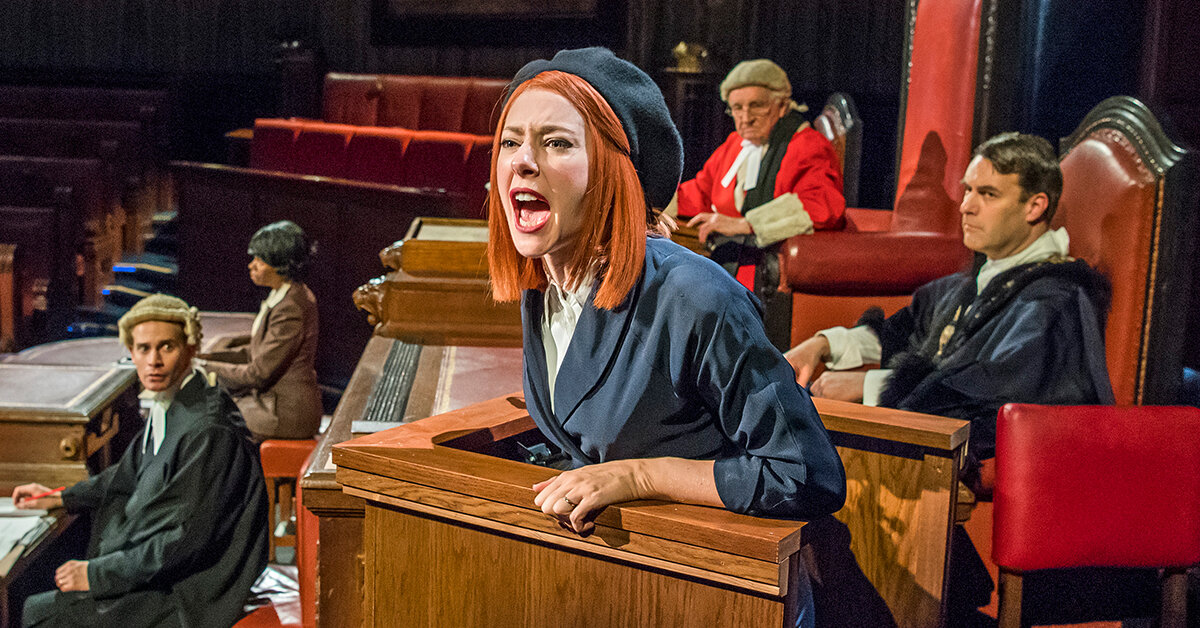
Set in 1904, August Wilson’s Gem of the Ocean is the ninth work in his Century Cycle, which has recorded the American Black experience and helped to define generations. In this piece, Aunt Esther, a fiery 285-year-old matriarch, welcomes into her Hill District home Solly Two Kings, who was born into slavery and scouted for the Union Army, and Citizen Barlow, a young man from Alabama searching for a new life. Marin Theatre Company recently produced Gem of the Ocean, and we are proud to share their dramaturg’s pieces on the impact and influence of Wilson’s work. Be sure not to miss this three part series.
August Wilson gave himself the artistic and political task of writing a play for each decade of the 20th Century that reflects the key issue for Black people during that decade. Among the most well known in this Century Cycle are Fences (1950s) which considers how Black people can make healthy families while mired in racist oppression, Ma Rainey’s Black Bottom (1920s) which examines the white appropriation and commodification of Black art, Joe Turner’s Come and Gone (1910s) which asks how Black people can re-fashion their spirits after enslavement, and Two Trains Running (1960s) that looks at the most effective strategies for generating Black agency and autonomy. With Gem of the Ocean (1900s) Wilson takes up the challenges of citizenship as Black people move from enslavement into some brand of freedom. When the enslavement of Africans was legally abolished in 1863 (and 1865 in Texas where the news of freedom was tragically, belatedly revealed), the questions arose—How do these Black beings fit into the political structure and psychic necessities of the United States? What role could these persons have after living as property, enduring the dismantling of family bonds, and navigating the dehumanization that the institution of slavery required? How could persons who were not fully counted toward state representation be woven into the fabric of a nation ostensibly built on the rights of the individual to “life, and liberty, and the pursuit of happiness” as stated in the U.S. Declaration of Independence?
Wilson’s audacious choice to give the name Citizen to a central character of Gem of the Ocean begs an examination of these questions.
Africans were in North America as early as 1619. Gem of the Ocean is set in 1904. The energy that sometimes subtly, sometimes boldly presides over the play is Aunt Ester, a 285-year-old force of nature. 1619 plus 285 equals 1904—this equation lets us know that Aunt Ester has been loving/protecting/guiding Black people since the start of our presence in North America. It is Aunt Ester who is called upon to help Citizen “cleanse his soul,” and one can only imagine how much cleansing she has had to perform in her centuries of living.
During the 1787 U.S. Constitutional Convention, the Three-Fifths Compromise was enacted. This legislation was an agreement between the Southern and Northern states on how enslaved Africans should be included in the population count for the purposes of taxation and representation. The number of state representatives in the House of Representatives is determined by a state’s population. If enslaved Africans were counted in the way free citizens were counted, this would give the South a decided edge in the House of Representatives. If only free citizens were counted, this would erase the presence of the enslaved Africans all together and put the South at a disadvantage in the House. The states agreed to add the “whole number of free persons” with “three fifths of all other Persons” thereby affirming the non-human and therefore non-citizen position of the enslaved Africans.
The Dred Scott Decision of 1857 is perhaps the most famous denouncement of Black citizenship in the United States. After Scott’s owners refused to take his payment for himself and his family, and after losing two later law suits that argued for their citizenship, Scott brought his case to the Supreme Court. In bringing down its decision against Scott, the Supreme Court ensured that any African, enslaved or free, could not be a citizen.
The Emancipation Proclamation of 1863 granted freedom to enslaved Africans in those Southern states that were at war with the United States. The Thirteenth Amendment of 1865 made slavery and indentured servitude illegal in all U.S. jurisdictions. But it was the Fourteenth Amendment of 1868 which directly addressed citizenship for Black people. It states,
All persons born or naturalized in the United States, and subject to the jurisdiction thereof, are citizens of the United States and of the state wherein they reside. No state shall make or enforce any law which shall abridge the privileges or immunities of citizens of the United States; nor shall any state deprive any person of life, liberty, or property, without due process of law; nor deny to any person within its jurisdiction the equal protection of the laws.
The clause “the equal protection of the laws” is the most litigated section of the amendment, and has been used to argue Black civil rights cases as well as Roe v. Wade on abortion rights, and same-sex marriage. It is important to note how women and Queer people have fought for full citizenship because this reminds us that Black citizenship includes all Black people. “Equal protection” is the key to citizenship, and it is the very clause that has been denied Black people in the U.S.
The denial of citizenship rights has been most graphically, though not exclusively, enacted in the Southern states. Black people fled the domestic terrorism and systematic economic exploitation of the South in the hopes of finding sanctuary and opportunity in the North. In The Warmth of Other Suns, Isabel Wilkerson documents how this exodus lasted much longer, involved more people, and generated more change than previous scholarship had suggested. She writes,
Over the course of six decades, some six million black southerners left the land of their forefathers and fanned out across the country for an uncertain existence in nearly every other corner of America. The Great Migration would become a turning point in history. It would transform urban America and recast the social and political order of every city it touched. (9)
The Black residents of Pittsburgh, where Gem of the Ocean is set, were likely to be Southern transplants seeking a better life. Both Citizen and Solly made their way to Pittsburgh from Alabama where, Solly’s sister says, “. . .the times are terrible here the most anybody remember since bondage. The people are having a hard time with freedom. . .The white peoples is gone crazy and won’t let anybody leave.” What Black people soon learned was that the North was hardly the refuge they had hoped. Redlining that severely limited housing options, salaries substantially less than those of their white counterparts, and the temptation of crime and drugs to ameliorate the lack of resources and ongoing racism made Northern living untenable in ways that the Black migrants could not have anticipated.
The Civil Rights Act of 1964 attempts to shore up Black citizenship particularly around voting rights, access to education, and the use of public facilities. But as Black Studies scholar Christen Smith notes in Afro-Paradise, “the idea that blackness and citizenship are mutually exclusive continues to haunt the US legal system.” Because the abjection of Black people is positioned as the absolute opposite of freedom, the society must re
peatedly demonstrate the non-citizen position that Black people hold in order to maintain the structure of the society. This maintenance results in a host of micro-aggressions (being followed by clerks while shopping, having credentials questioned, being subjected to questions about hair, food, and illegal drugs) as well as the now widely public State-sanctioned violence persistently wielded against Black people. The resultant protests in neighborhoods and college campuses across the country, is evidence of the failures of citizenship.
Today, we know the grim anticipation of additions to the litany of names of those Black people who have born a high price of non-citizenship—Rekia Boyd, Eric Garner, Sandra Bland, Oscar Grant, Trayvon Martin, Kayla Moore, Michael Brown, Laquan McDonald, Mario Woods are among the most widely publicized Black people killed by police officers or vigilantes in recent years. These facts make the Marin Theatre Company’s production of Gem of the Ocean uniquely important for our time. Under the direction of Daniel Alexander Jones, this production employs the theatrical jazz aesthetics that rest on “the break”—the jazz space where improvisation happens, where the unknown is sought, where Black life is allowed to flourish free of externally imposed sanctions. This fertile space of new possibilities is precisely what the present moment of racial turmoil demands.
If we are still fighting for this constitutional right in 2016, Black people in 1904 could not simply assume the role of citizen, even if they bore such confoundingly ironic names. In response to learning Citizen’s name, Solly, who has lived through enslavement and therefore knows a thing or two about freedom and citizenship, says, “Your mama’s trying to tell you something. She put a heavy load on you. It’s hard to be a citizen. You gonna have to fight to get that. And time you get it you be surprised how heavy it is.” Heavy with choice and responsibility. Although Gem of the Ocean is set in 1904, it was written in 2003. Wilson, a self-professed “race man,” was steeped in the history of densely legislated Black lives and the persistent disregard of Black injustices. He sets Solly’s escape to freedom in 1857, the very year that Dred Scott was denied citizenship by the Supreme Court. 1839, the address of Aunt Ester’s home on Wylie Avenue, is also the first year women were allowed to vote at the American Anti-Slavery Society convention, and the year the slave ship La Amistad is brought to the U.S. from Cuba following a successful rebellion by enslaved Africans. Wilson has subtly coded agency and freedom throughout Gem of the Ocean.
What does the play itself tell us about Black citizenship? Is it born of the laws that Caesar cruelly wields? What opportunity does Aunt Ester hold for Citizen, and by extension, all Black people? How might spirit animate citizenship? Citizenship for Black Americans is not granted through the very legal system that has mandated Black dehumanization. In Gem of the Ocean, August Wilson offers social relations, community responsibility, and individual accountability as the interlocking rivers of an authentic Black citizenship—and he takes us to the depths of the sea to learn it.
To purchase a copy of August Wilson’s Gem of the Ocean, click here, and to learn more about licensing a production, click here.

Kate Chopin in New Orleans: Mother-Daughter Author Duo Collaborate on Historical Book

Heathers The Musical: 10 Facts for 10 Years

